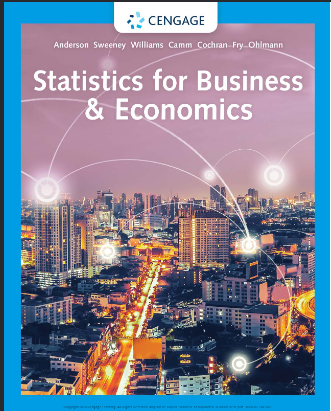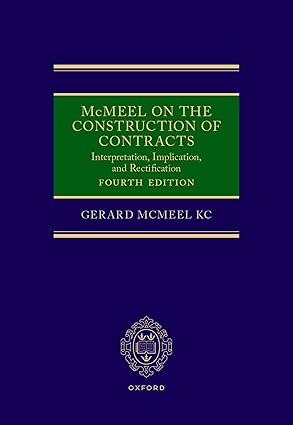The text introduces the student to the software packages of JMP Student Edition 14e and Microsoft® Office Excel 2016 and emphasizes the role of computer software in the application of statistical analysis. JMP is illustrated as it is one of the leading statistical software packages for both education and statistical practice. Excel is not a statistical software package, but the wide availability and use of Excel make it important for students to understand the statistical capabilities of this package. JMP and Excel procedures are provided in appendices so that in- structors have the flexibility of using as much computer emphasis as desired for the course. MindTap Reader includes appendices for using R for statistical analysis. R is an open-source programming language that is widely used in practice to perform statistical analysis. The use of R typically requires more training than the use of software such as JMP or Excel, but the soft- ware is extremely powerful. To ease students’ introduction to the R language, we also use RStudio which provides an integrated development environment for R
چکیده فارسی
این متن دانشجو را با بستههای نرمافزاری JMP Student Edition 14e و Microsoft® Office Excel 2016 آشنا میکند و بر نقش نرمافزار رایانهای در کاربرد تحلیلهای آماری تأکید میکند. JMP نشان داده شده است زیرا یکی از بسته های نرم افزار آماری پیشرو برای آموزش و تمرین آماری است. اکسل یک بسته نرم افزاری آماری نیست، اما در دسترس بودن و استفاده گسترده از اکسل، درک توانایی های آماری این بسته را برای دانش آموزان مهم می کند. رویههای JMP و Excel در ضمیمهها ارائه شدهاند تا مدرسان انعطافپذیری لازم را برای استفاده از تأکید رایانهای به میزان دلخواه برای دوره داشته باشند. MindTap Reader شامل ضمائم برای استفاده از R برای تجزیه و تحلیل آماری است. R یک زبان برنامه نویسی متن باز است که به طور گسترده در عمل برای انجام تحلیل های آماری استفاده می شود. استفاده از R معمولاً به آموزش بیشتری نسبت به استفاده از نرم افزارهایی مانند JMP یا Excel نیاز دارد، اما این نرم افزار بسیار قدرتمند است. برای سهولت آشنایی دانش آموزان با زبان R، ما همچنین از RStudio استفاده می کنیم که یک محیط توسعه یکپارچه برای R
فراهم می کند.
ادامه ...
بستن ...
2020, 2017 Cengage Learning, Inc.
Unless otherwise noted, all content is © Cengage.
ALL RIGHTS RESERVED. No part of this work covered by the copyright herein
may be reproduced or distributed in any form or by any means, except as
permitted by U.S. copyright law, without the prior written permission of the
copyright owner.
For product information and technology assistance, contact us at
Cengage Customer & Sales Support, 1-800-354-9706 or
support.cengage.com.
For permission to use material from this text or product,
submit all requests online at www.cengage.com/permissions.
Library of Congress Control Number: 2018965692
ISBN: 978-1-337-90106-2
Cengage
20 Channel Center Street
Boston, MA 02210
USA
Cengage is a lea
ادامه ...
بستن ...
Contents xi
Case Problem 2: Ethical Behavior of Business Students
at Bayview University 469
Appendix 9.1 Hypothesis Testing with JMP 471
Appendix 9.2 Hypothesis Testing with Excel 475
Appendix 9.3 Hypothesis Testing with R (MindTap Reader)
Chapter 10 inference about Means and proportions with
two populations 481
Statistics in Practice: U.S. Food and Drug Administration 482
10.1 Inferences About the Difference Between Two
Population Means: s1 and s2 Known 483
Interval Estimation of m1 − m2 483
Hypothesis Tests About m1 − m2 485
Practical Advice 487
10.2 Inferences About the Difference Between Two
Population Means: s1 and s2 Unknown 489
Interval Estimation of m1 − m2 489
Hypothesis Tests About m1 − m2 491
Practical Advice 493
10.3 Inferences About the Difference Between Two
Population Means: Matched Samples 497
10.4 Inferences About the Difference Between Two Population
Proportions 503
Interval Estimation of p1 − p2 503
Hypothesis Tests About p1 − p2 505
Summary 509
Glossary 509
Key Formulas 509
Supplementary Exercises 511
Case Problem: Par, Inc. 514
Appendix 10.1 Inferences About Two Populations with JMP 515
Appendix 10.2 Inferences About Two Populations with Excel 519
Appendix 10.3 Inferences about Two Populations with R (MindTap Reader)
Chapter 11 inferences about population Variances 525
Statistics in Practice: U.S. Government Accountability Office 526
11.1 Inferences About a Population Variance 527
Interval Estimation 527
Hypothesis Testing 531
11.2 Inferences About Two Population Variances 537
Summary 544
Key Formulas 544
Supplementary Exercises 544
Case Problem 1: Air Force Training Program 546
Copyright 2020 Cengage Learning. All Rights Reserved. May not be copied, scanned, or duplicated, in whole or in part. Due to electronic rights, some third party content may be suppressed from the eBook and/or eChapter(s).
Editorial review has deemed that any suppressed content does not materially affect the overall learning experience. Cengage Learning reserves the right to remove additional content at any time if subsequent rights restrictions require it.Copyright 2020 Cengage Learning. All Rights Reserved. May not be copied, scanned, or duplicated, in whole or in part. WCN 02-200-203
xii Contents
Case Problem 2: Meticulous Drill & Reamer 547
Appendix 11.1 Population Variances with JMP 549
Appendix 11.2 Population Variances with Excel 551
Appendix 11.3 Population Variances with R (MindTap Reader)
Chapter 12 Comparing Multiple proportions, test of
independence and Goodness of Fit 553
Statistics in Practice: United Way 554
12.1 Testing the Equality of Population Proportions
for Three or More Populations 555
A Multiple Comparison Procedure 560
12.2 Test of Independence 565
12.3 Goodness of Fit Test 573
Multinomial Probability Distribution 573
Normal Probability Distribution 576
Summary 582
Glossary 582
Key Formulas 583
Supplementary Exercises 583
Case Problem 1: A Bipartisan Agenda for Change 587
Case Problem 2: Fuentes Salty Snacks, Inc. 588
Case Problem 3: Fresno Board Games 588
Appendix 12.1 Chi-Square Tests with JMP 590
Appendix 12.2 Chi-Square Tests with Excel 593
Appendix 12.3 Chi-Squared Tests with R (MindTap Reader)
Chapter 13 experimental design and analysis
of Variance 597
Statistics in Practice: Burke Marketing Services, Inc. 598
13.1 An Introduction to Experimental Design
and Analysis of Variance 599
Data Collection 600
Assumptions for Analysis of Variance 601
Analysis of Variance: A Conceptual Overview 601
13.2 Analysis of Variance and the Completely
Randomized Design 604
Between-Treatments Estimate of Population Variance 605
Within-Treatments Estimate of Population Variance 606
Comparing the Variance Estimates: The F Test 606
ANOVA Table 608
Computer Results for Analysis of Variance 609
Testing for the Equality of k Population Means:
An Observational Study 610
13.3 Multiple Comparison Procedures 615
Fisher’s LSD 615
Type I Error Rates 617
Copyright 2020 Cengage Learning. All Rights Reserved. May not be copied, scanned, or duplicated, in whole or in part. Due to electronic rights, some third party content may be suppressed from the eBook and/or eChapter(s).
Editorial review has deemed that any suppressed content does not materially affect the overall learning experience. Cengage Learning reserves the right to remove additional content at any time if subsequent rights restrictions require it.Copyright 2020 Cengage Learning. All Rights Reserved. May not be copied, scanned, or duplicated, in whole or in part. WCN 02-200-203
Contents xiii
13.4 Randomized Block Design 621
Air Traffic Controller Stress Test 621
ANOVA Procedure 623
Computations and Conclusions 623
13.5 Factorial Experiment 627
ANOVA Procedure 629
Computations and Conclusions 629
Summary 635
Glossary 635
Key Formulas 636
Supplementary Exercises 638
Case Problem 1: Wentworth Medical Center 643
Case Problem 2: Compensation for Sales Professionals 644
Case Problem 3: Touristopia Travel 644
Appendix 13.1 Analysis of Variance with JMP 646
Appendix 13.2 Analysis of Variance with Excel 649
Appendix 13.3 Analysis Variance with R (MindTap Reader)
Chapter 14 Simple Linear regression 653
Statistics in Practice: Alliance Data Systems 654
14.1 Simple Linear Regression Model 655
Regression Model and Regression Equation 655
Estimated Regression Equation 656
14.2 Least Squares Method 658
14.3 Coefficient of Determination 668
Correlation Coefficient 671
14.4 Model Assumptions 675
14.5 Testing for Significance 676
Estimate of s2 676
t Test 677
Confidence Interval for b1 679
F Test 679
Some Cautions About the Interpretation of Significance Tests 681
14.6 Using the Estimated Regression Equation
for Estimation and Prediction 684
Interval Estimation 685
Confidence Interval for the Mean Value of y 685
Prediction Interval for an Individual Value of y 686
14.7 Computer Solution 691
14.8 Residual Analysis: Validating Model Assumptions 694
Residual Plot Against x 695
Residual Plot Against yˆ 697
Standardized Residuals 698
Normal Probability Plot 699
Copyright 2020 Cengage Learning. All Rights Reserved. May not be copied, scanned, or duplicated, in whole or in part. Due to electronic rights, some third party content may be suppressed from the eBook and/or eChapter(s).
Editorial review has deemed that any suppressed content does not materially affect the overall learning experience. Cengage Learning reserves the right to remove additional content at any time if subsequent rights restrictions require it.Copyright 2020 Cengage Learning. All Rights Reserved. May not be copied, scanned, or duplicated, in whole or in part. WCN 02-200-203
xiv Contents
14.9 Residual Analysis: Outliers and Influential Observations 703
Detecting Outliers 703
Detecting Influential Observations 704
14.10 Practical Advice: Big Data and Hypothesis Testing in Simple Linear
Regression 710
Summary 711
Glossary 711
Key Formulas 712
Supplementary Exercises 714
Case Problem 1: Measuring Stock Market Risk 721
Case Problem 2: U.S. Department of Transportation 721
Case Problem 3: Selecting a Point-and-Shoot Digital Camera 722
Case Problem 4: Finding the Best Car Value 723
Case Problem 5: Buckeye Creek Amusement Park 724
Appendix 14.1 Calculus-Based Derivation of Least Squares Formulas 726
Appendix 14.2 A Test for Significance Using Correlation 727
Appendix 14.3 Simple Linear Regression with JMP 727
Appendix 14.4 Regression Analysis with Excel 728
Appendix 14.5 Simple Linear Regression with R (MindTap Reader)
Chapter 15 Multiple regression 731
Statistics in Practice: 84.51° 732
15.1 Multiple Regression Model 733
Regression Model and Regression Equation 733
Estimated Multiple Regression Equation 733
15.2 Least Squares Method 734
An Example: Butler Trucking Company 735
Note on Interpretation of Coefficients 737
15.3 Multiple Coefficient of Determination 743
15.4 Model Assumptions 746
15.5 Testing for Significance 747
F Test 747
t Test 750
Multicollinearity 750
15.6 Using the Estimated Regression Equation
for Estimation and Prediction 753
15.7 Categorical Independent Variables 755
An Example: Johnson Filtration, Inc. 756
Interpreting the Parameters 758
More Complex Categorical Variables 760
15.8 Residual Analysis 764
Detecting Outliers 766
Studentized Deleted Residuals and Outliers 766
Influential Observations 767
Using Cook’s Distance Measure to Identify
Influential Observations 767
Copyright 2020 Cengage Learning. All Rights Reserved. May not be copied, scanned, or duplicated, in whole or in part. Due to electronic rights, some third party content may be suppressed from the eBook and/or eChapter(s).
Editorial review has deemed that any suppressed content does not materially affect the overall learning experience. Cengage Learning reserves the right to remove additional content at any time if subsequent rights restrictions require it.Copyright 2020 Cengage Learning. All Rights Reserved. May not be copied, scanned, or duplicated, in whole or in part. WCN 02-200-203
Contents xv
15.9 Logistic Regression 771
Logistic Regression Equation 772
Estimating the Logistic Regression Equation 773
Testing for Significance 774
Managerial Use 775
Interpreting the Logistic Regression Equation 776
Logit Transformation 778
15.10 Practical Advice: Big Data and Hypothesis Testing
in Multiple Regression 782
Summary 783
Glossary 783
Key Formulas 784
Supplementary Exercises 786
Case Problem 1: Consumer Research, Inc. 790
Case Problem 2: Predicting Winnings for NASCAR Drivers 791
Case Problem 3: Finding the Best Car Value 792
Appendix 15.1 Multiple Linear Regression with JMP 794
Appendix 15.2 Logistic Regression with JMP 796
Appendix 15.3 Multiple Regression with Excel 797
Appendix 15.4 Multiple Linear Regression with R (MindTap Reader)
Appendix 15.5 Logistics Regression with R (MindTap Reader)
Chapter 16 regression analysis: Model Building 799
Statistics in Practice: Monsanto Company 800
16.1 General Linear Model 801
Modeling Curvilinear Relationships 801
Interaction 805
Transformations Involving the Dependent Variable 807
Nonlinear Models That Are Intrinsically Linear 812
16.2 Determining When to Add or Delete Variables 816
General Case 818
Use of p-Values 819
16.3 Analysis of a Larger Problem 822
16.4 Variable Selection Procedures 826
Stepwise Regression 826
Forward Selection 828
Backward Elimination 828
Best-Subsets Regression 828
Making the Final Choice 829
16.5 Multiple Regression Approach to Experimental Design 832
16.6 Autocorrelation and the Durbin-Watson Test 836
Summary 840
Glossary 841
Key Formulas 841
Copyright 2020 Cengage Learning. All Rights Reserved. May not be copied, scanned, or duplicated, in whole or in part. Due to electronic rights, some third party content may be suppressed from the eBook and/or eChapter(s).
Editorial review has deemed that any suppressed content does not materially affect the overall learning experience. Cengage Learning reserves the right to remove additional content at any time if subsequent rights restrictions require it.Copyright 2020 Cengage Learning. All Rights Reserved. May not be copied, scanned, or duplicated, in whole or in part. WCN 02-200-203
xvi Contents
Supplementary Exercises 841
Case Problem 1: Analysis of LPGA Tour Statistics 845
Case Problem 2: Rating Wines from the Piedmont Region of Italy 846
Appendix 16.1 Variable Selection Procedures with JMP 848
Appendix 16.2 Variable Selection Procedures with R (MindTap Reader)
Chapter 17 time Series analysis and Forecasting 859
Statistics in Practice: Nevada Occupational Health Clinic 860
17.1 Time Series Patterns 861
Horizontal Pattern 861
Trend Pattern 863
Seasonal Pattern 863
Trend and Seasonal Pattern 864
Cyclical Pattern 864
Selecting a Forecasting Method 866
17.2 Forecast Accuracy 867
17.3 Moving Averages and Exponential Smoothing 872
Moving Averages 872
Weighted Moving Averages 874
Exponential Smoothing 875
17.4 Trend Projection 881
Linear Trend Regression 882
Nonlinear Trend Regression 886
17.5 Seasonality and Trend 891
Seasonality Without Trend 892
Seasonality and Trend 894
Models Based on Monthly Data 897
17.6 Time Series Decomposition 900
Calculating the Seasonal Indexes 902
Deseasonalizing the Time Series 905
Using the Deseasonalized Time Series to Identify Trend 905
Seasonal Adjustments 907
Models Based on Monthly Data 908
Cyclical Component 908
Summary 910
Glossary 911
Key Formulas 912
Supplementary Exercises 913
Case Problem 1: Forecasting Food and Beverage Sales 917
Case Problem 2: Forecasting Lost Sales 918
Appendix 17.1 Forecasting with JMP 920
Appendix 17.2 Forecasting with Excel 926
Appendix 17.3 Forecasting with R (MindTap Reader)
Copyright 2020 Cengage Learning. All Rights Reserved. May not be copied, scanned, or duplicated, in whole or in part. Due to electronic rights, some third party content may be suppressed from the eBook and/or eChapter(s).
Editorial review has deemed that any suppressed content does not materially affect the overall learning experience. Cengage Learning reserves the right to remove additional content at any time if subsequent rights restrictions require it.Copyright 2020 Cengage Learning. All Rights Reserved. May not be copied, scanned, or duplicated, in whole or in part. WCN 02-200-203
Contents xvii
Chapter 18 nonparametric Methods 931
Statistics in Practice: West Shell Realtors 932
18.1 Sign Test 933
Hypothesis Test About a Population Median 933
Hypothesis Test with Matched Samples 938
18.2 Wilcoxon Signed-Rank Test 941
18.3 Mann-Whitney-Wilcoxon Test 947
18.4 Kruskal-Wallis Test 956
18.5 Rank Correlation 961
Summary 966
Glossary 966
Key Formulas 967
Supplementary Exercises 968
Case Problem: RainOrShine.Com 971
Appendix 18.1 Nonparametric Methods with JMP 972
Appendix 18.2 Nonparametric Methods with Excel 979
Appendix 18.3 Nonparametric Methods with R (MindTap Reader)
Chapter 19 decision analysis 981
Statistics in Practice: Ohio Edison Company 982
19.1 Problem Formulation 983
Payoff Tables 983
Decision Trees 984
19.2 Decision Making with Probabilities 985
Expected Value Approach 985
Expected Value of Perfect Information 987
19.3 Decision Analysis with Sample Information 992
Decision Tree 993
Decision Strategy 994
Expected Value of Sample Information 998
19.4 Computing Branch Probabilities Using Bayes’ Theorem 1002
Summary 1006
Glossary 1007
Key Formulas 1008
Supplementary Exercises 1008
Case Problem 1: Lawsuit Defense Strategy 1010
Case Problem 2: Property Purchase Strategy 1011
Chapter 20 index numbers 1013
Statistics in Practice: U.S. Department of Labor, Bureau
of Labor Statistics 1014
20.1 Price Relatives 1014
20.2 Aggregate Price Indexes 1015
Copyright 2020 Cengage Learning. All Rights Reserved. May not be copied, scanned, or duplicated, in whole or in part. Due to electronic rights, some third party content may be suppressed from the eBook and/or eChapter(s).
Editorial review has deemed that any suppressed content does not materially affect the overall learning experience. Cengage Learning reserves the right to remove additional content at any time if subsequent rights restrictions require it.Copyright 2020 Cengage Learning. All Rights Reserved. May not be copied, scanned, or duplicated, in whole or in part. WCN 02-200-203
xviii Contents
20.3 Computing an Aggregate Price Index from Price Relatives 1019
20.4 Some Important Price Indexes 1021
Consumer Price Index 1021
Producer Price Index 1021
Dow Jones Averages 1022
20.5 Deflating a Series by Price Indexes 1023
20.6 Price Indexes: Other Considerations 1026
Selection of Items 1026
Selection of a Base Period 1026
Quality Changes 1027
20.7 Quantity Indexes 1027
Summary 1029
Glossary 1029
Key Formulas 1029
Supplementary Exercises 1030
Chapter 21 Statistical Methods for Quality Control 1033
Statistics in Practice: Dow Chemical Company 1034
21.1 Philosophies and Frameworks 1035
Malcolm Baldrige National Quality Award 1036
ISO 9000 1036
Six Sigma 1036
Quality in the Service Sector 1038
21.2 Statistical Process Control 1039
Control Charts 1040
x Chart: Process Mean and Standard Deviation Known 1041
x Chart: Process Mean and Standard Deviation Unknown 1043
R Chart 1045
p Chart 1046
np Chart 1049
Interpretation of Control Charts 1049
21.3 Acceptance Sampling 1052
KALI, Inc.: An Example of Acceptance Sampling 1053
Computing the Probability of Accepting a Lot 1054
Selecting an Acceptance Sampling Plan 1056
Multiple Sampling Plans 1057
Summary 1059
Glossary 1060
Key Formulas 1060
Supplementary Exercises 1061
Appendix 21.1 Control Charts with JMP 1064
Appendix 21.2 Control Charts with R (MindTap Reader)
Copyright 2020 Cengage Learning. All Rights Reserved. May not be copied, scanned, or duplicated, in whole or in part. Due to electronic rights, some third party content may be suppressed from the eBook and/or eChapter(s).
Editorial review has deemed that any suppressed content does not materially affect the overall learning experience. Cengage Learning reserves the right to remove additional content at any time if subsequent rights restrictions require it.Copyright 2020 Cengage Learning. All Rights Reserved. May not be copied, scanned, or duplicated, in whole or in part. WCN 02-200-203
Contents xix
Chapter 22 Sample Survey (Mindtap reader) 22-1
Statistics in Practice: Duke Energy 22-2
22.1 Terminology Used in Sample Surveys 22-2
22.2 Types of Surveys and Sampling Methods 22-3
22.3 Survey Errors 22-5
Nonsampling Error 22-5
Sampling Error 22-5
22.4 Simple Random Sampling 22-6
Population Mean 22-6
Population Total 22-7
Population Proportion 22-8
Determining the Sample Size 22-9
22.5 Stratified Simple Random Sampling 22-12
Population Mean 22-12
Population Total 22-14
Population Proportion 22-15
Determining the Sample Size 22-16
22.6 Cluster Sampling 22-21
Population Mean 22-23
Population Total 22-25
Population Proportion 22-25
Determining the Sample Size 22-27
22.7 Systematic Sampling 22-29
Summary 22-29
Glossary 22-30
Key Formulas 22-30
Supplementary Exercises 22-34
Case Problem: Medicament’s Predicament 22-36
appendix a References and Bibliography 1068
appendix B Tables 1070
appendix C Summation Notation 1097
appendix d Answers to Even-Numbered Exercises (MindTap Reader)
appendix e Microsoft Excel 2016 and Tools for Statistical Analysis 1099
appendix F Computing p-Values with JMP and Excel 1107
index 1111
ادامه ...
بستن ...










